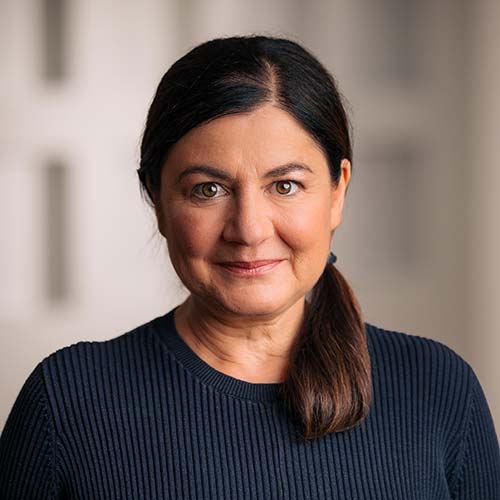The 50+ generation loves and lives much more freely and uncompromisingly than the generations of the same age before them. Women in particular are experiencing a new level of emancipation in the second half of their lives, defending the freedom they have gained and not wanting to fall back into the role of provider. This results in both a remarkable liveliness and a departure into the non-binding.
"Men only as outpatients, no longer as inpatients"!
57% of female singles in the 50 to 70 age group do not want a relationship. Among male singles, only 46% do not want a relationship. Men are even more romantic when it comes to looking for a relationship. While 81% of single men are looking for the love of their life, only 73% of comparable women are.
63% describe their partnership as a romantic relationship
Overall, people who are in a relationship are relatively satisfied with their partners; only eight percent are rather dissatisfied with their relationships. As many as 63% speak of a loving relationship.
The 50+ generation is a "me now!" generation
It was important to respondents of both genders to fulfill their own purpose in life and to pay more attention to their own needs than before. The 50+ generation is therefore also a "Me now!" generation. These are the key findings of the latest Witt study, conducted by the rheingold Institute, which examined the attitude to life and relationship life of the 50+ generation in Germany. The study is based on 65 two-hour in-depth psychological interviews and a representative online survey of 1,061 people aged between 50 and 70.
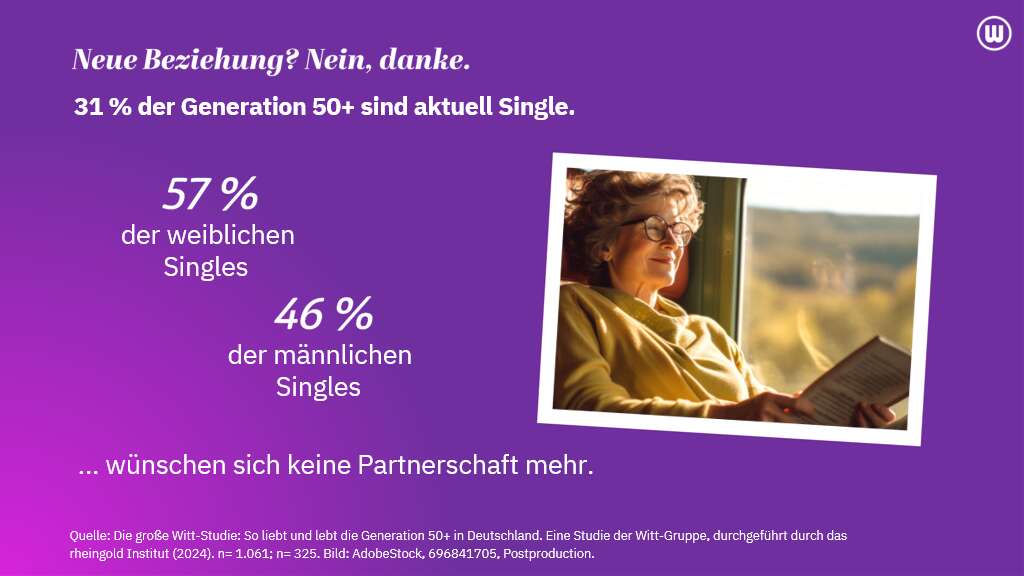
Women 50+: full of energy, open and ready for new beginnings
The female part of the "Now Me!" generation showed a particular willingness to experiment and transform their relationship life While men seem to be more focused on their partner, women tend to be more open and, for example, undertake numerous leisure activities with friends, acquaintances or their children. On average, men do the activities surveyed 6% more often with their partners than women.
Click here for the recording of the presentation of the study from September 3, 2024
Women have more stable social networks
Women have more stable social networks. 41% of women fully agree with the statement that they can rely on their friends (men 31%). Overall, the female part of the 50+ generation in particular demonstrates a remarkable level of energy and a willingness to make new beginnings in relationships and other areas of life. "I'm like Pippi Longstocking and make the world the way I like it," said one female respondent, aged 69, in the interview.
Freedom instead of commitment: women 50+ seek freedom from obligation
"We know from previous studies that this generation of women in particular was torn between partnership, family and career in their younger years," comments Stephan Grünewald, founder of the rheingold Institute. As they mature, they now insist on their independence and defend their freedom, some even at the cost of refusing a new partnership. "Women in the second half of their lives are more likely than in the past to be looking for a new beginning," says Grünewald. This means that they no longer want to commit themselves so strongly or tie themselves down. True to the motto "Men only outpatient, no longer inpatient", as one participant notes in the interview.
Men fight to maintain the status quo, also in terms of sexuality
In contrast to women, men focus less on development and more on "holding on" in many areas. They try to push ageing far away and maintain a status quo of vitality, mobility and flexibility. This also applies to the desire for sexuality and demonstrated potency. Instead of "I'm old", men tend to say: "I'm still the old man." When it comes to sexuality, they also want more of a link to earlier times. Men looking for a relationship attach great importance to good sex (70%), while this is only a priority for 31% of women. In line with the cliché, they are also more likely to want to find a younger partner (men 58% vs. women 30%). 10% of 50-70-year-olds use dating portals, especially Tinder and Finya.
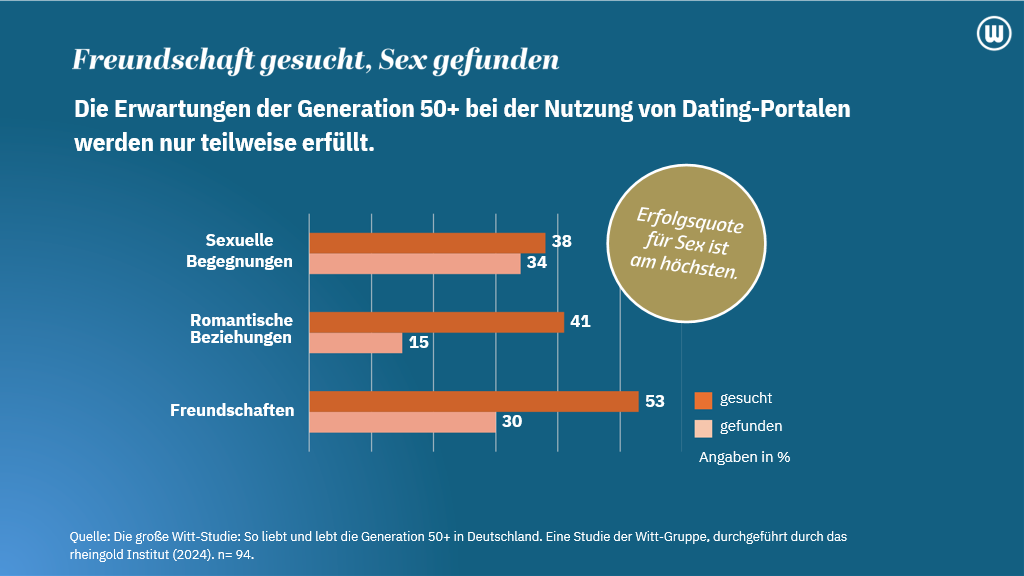
No lull in bed, but would like more
Overall, the 50+ generation is a sexually active group (only 22% state that they don't have sex at all) that would like to have more sex. 49% would like to have sex several times a month or more often. However, this is only a reality for 30% of respondents. However, the number of those who do not have sex increases with age (50-54 years = 15 %; 55-59 years = 20 %; 60-64 years = 26 %; 65-70 years = 25 %).
Relationships: the majority speak of love
Overall, people who are in a relationship are relatively satisfied with their partners; only eight percent are rather dissatisfied with their relationships. As many as 63% describe their relationship as a love relationship and 25% as a mixture of a relationship of convenience and love. Only four percent describe their current relationship as purely a relationship of convenience. This also shows that the 50+ generation no longer makes compromises and is not prepared to remain in an unsatisfactory relationship.
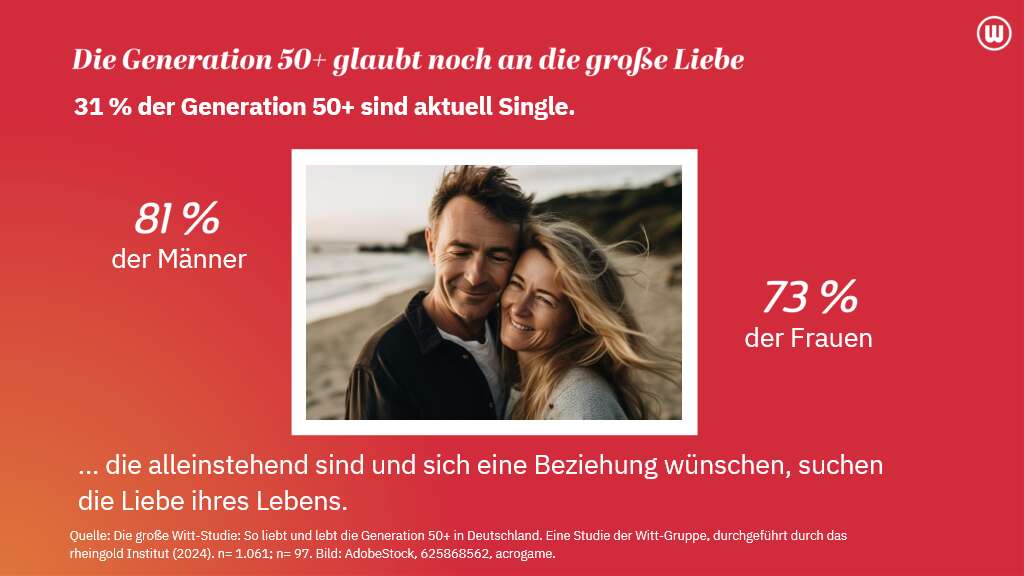
Loneliness not the dominant theme
Although loneliness is a much-discussed topic in society, it does not appear to be the dominant theme in the 50+ generation. Only 25% of respondents say that they sometimes feel isolated. Gender or age play less of a role when it comes to loneliness than retirement - 30% of retirees vs. 23% of those in employment sometimes feel isolated. This age group is much more concerned about a possible restriction of their autonomy.
Diversity of possibilities and a departure into the non-binding
In the two-hour interviews, it becomes clear that old age has become a distant memory for this generation. Many are actively looking for new opportunities and adventures. In some cases, they are experimenting with a complete change of image and want to rekindle the fire. One 67-year-old participant reports: "I want to put a comedy program on stage again. It's never let go of me, but somehow I've never dared to do it before." A 55-year-old is planning to go abroad as a granny au pair. But projects don't always have to be put into practice.
In a kind of in-between world, the "Now me!" generation remains flexible and does not want to commit itself. Patchwork constellations, long-distance relationships or relationships without living together - there is a wide range of relationship arrangements. "This generation takes the freedom to use traditional relationship patterns or to reassemble the jigsaw puzzle of life by moving into the non-binding," says study director Heiko Thomas. Remaining non-committal promises a variety of possibilities - and not just for new relationships.
Women 50+ in particular feel young
The "Now Me!" generation between 50 and 70 clearly distinguishes itself from being old; most of them feel strong, lively and in the midst of life. Women in particular feel young, their perceived age is on average eight years younger than their biological age, while men of the same age feel six years younger. At the same time, women are also more generous in their assessment of others. From a female 50+ perspective, people are old from the age of 72, but for men it is as early as 69.
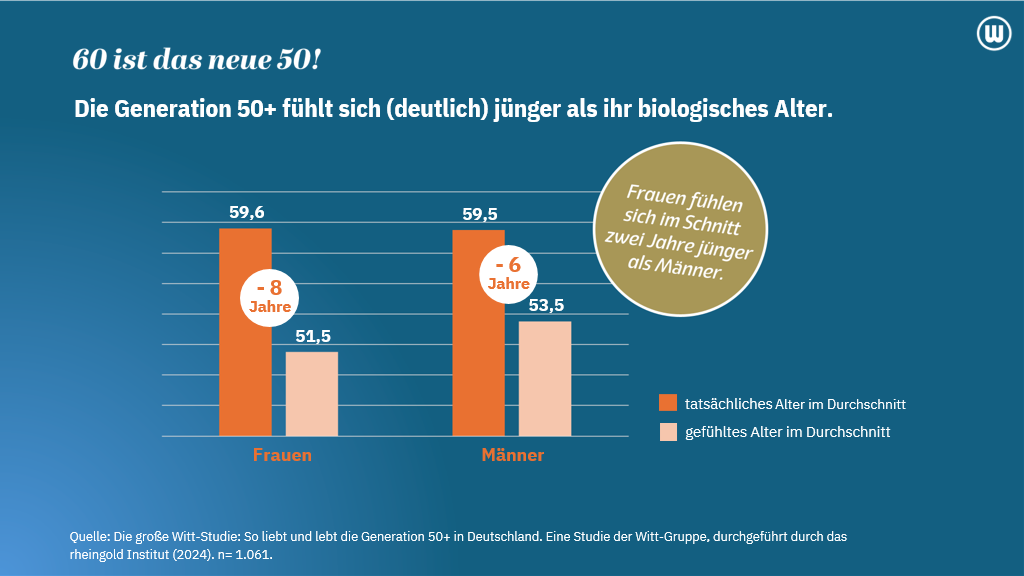
Youth mania "No, thank you!" - Midlife opportunity instead of midlife crisis
For 74% of respondents, old age only begins with a loss of autonomy and severe physical limitations. Overall, the generation wants to appear youthful, but is increasingly freeing itself from the obsession with youth, which is becoming less important as a compulsive driver. The majority of the 50+ generation accepts their wrinkles or gray hair and does not see them as a sign of old age (69%). At the same time, they want to keep fit, vital and mobile. 64% of respondents say they do sport and the majority are active. Their activities are very varied and do not necessarily correspond to the cliché. For example, 38% of the age group play video games. In addition to cooking, reading and traveling, they also go to parties with their children, go skydiving or buy motorcycles. The classic image of a sudden midlife crisis seems outdated; instead, this phase of life is seen as a midlife opportunity.
Biological age is difficult to determine by appearance
Overall, it was difficult to estimate the age of the interviewees. Younger representatives of the generation sometimes already appeared relatively old, while older ones sometimes still looked very young. For many, their biological age is not apparent from their clothing, appearance or demeanor. It seems as if the 50+ generation has not only emancipated itself in partnerships, but also from the constraints of age.
One 68-year-old participant summed it up: "Age is just a number. I'm only old in theory."
No-Go "Senior"
Terms such as "silver ager" or "best ager" are therefore rejected, and "senior citizen" is almost considered a dirty word. Instead, respondents identify themselves, if at all, with the neutral term "Generation 50+" (31%) or as belonging to the "Baby Boomers" (22%). Overall, however, the respondents feel that they belong to their generation.
Quote: "As a generation, we have the conservative in us, but we also lived the revolution: we are a cool generation, the youth of today envy us for the wild 70s!" (Woman, 67)
The study identifies six different types in relationships:
1. the keepers - "Loyalty Maintainers"
This group wants to maintain familiar structures and remain in old ties; they are most reminiscent of the lifestyle of previous generations of their age. Their understanding of roles is more traditional. They value loyalty, stable long-term relationships and reliable friends. Rituals are important in their daily routine. Continuity gives them security in life, but can also lead to them clinging to old patterns.
One 70-year-old participant describes it like this: "I no longer have a great passion, but I bring her flowers as a little gift."
2. the minimizers - "Flatliner"
The core factor for this group is reduction. They reduce their circle of friends to the most important relationships and also set clear priorities when it comes to activities. Overall, they seem satisfied with their relationship and seek happiness in small things. Flatliners make themselves comfortable in their relationship as if in their own realm, life is rather slow.
One participant, 69, says: "I leave nothing to be desired. I do what I like in small circles. I used to travel all over the world, but now I look for happiness close to home."
3. the stop-seekers - "Safety Cravers"
This group strives for previously non-existent stability and likes to force security. They value the relationship as a place of retreat and also make a stop in life overall. Their exhaustion is noticeable and they appear older overall. This type of relationship is more common in people who have had to deal with strokes of fate. They are not very interested in a dynamic love life, but rather in a stable partnership that stabilizes their life as a whole.
Quote: "I'm looking forward to retirement." (Woman, 55 years old)
4. the non-committal - "situation shippers"
In this group, non-commitment is seen as an opportunity. There is no intention of building a long-term relationship. The sporadic relationships are often uncompromising and characterized by coexistence. Representatives pursue their various interests with changing acquaintances. New relationships appear "loose" and are not permanent.
One 59-year-old participant explains: "I am less and less willing to compromise."
5. the eternally young - "Youth Repeater"
This group doesn't want youth to end. They go out partying, have younger friends and use dating portals to make new acquaintances. They are secretly driven by a fear of stagnation. They are often not in stable, long-term relationships and attach great importance to signs of their vitality such as youthful looks, sportiness and sex.
"My friends with my husband and children have completely fallen asleep. I don't want to have such a boring life, I'm happy with my long-distance relationship." (Woman, 50 years old)
6. the new starters - "Second Lifers"
These people reinvent themselves, their everyday lives and their relationships and strive for self-determination. Past partnerships have become a lesson in how things should not be done. Instead, they want autonomy, further development and new experiences. This type of relationship is more common among women.
One 59-year-old participant emphasizes: "I wouldn't want to share my life with anyone anymore, I'm glad that I can do what I want at home."
Generation "Me now!" wants to enjoy their lives
"The increasing self-referentiality of the 50+ generation is also a sign of the zeitgeist. Crises such as climate change, wars or the loss of substance in the German economy are repressed and kept as far away from their own lives as possible, just like the signs of their own mortality," says Stephan Grünewald. This corresponds to the way society as a whole is experiencing a postponement of a presumably uncomfortable and exhausting turning point in time. The "Now me!" generation loves and lives in the here and now. They have fought for a self-determined life and now want to enjoy it.
Witt study focuses on the 50+ generation
"Increasing demographic change means that older population groups are becoming more and more relevant. While everyone is talking about Generation Z, we are therefore focusing on the 50+ generation," explains Patrick Boos, CEO of the Witt Group. "In order to gain a better understanding of their needs, we set up the major Witt study together with rheingold. We wanted to find out in a scientifically sound way how the 50+ generation thinks, loves and lives. Now we have an even better understanding of what this generation really needs."
The Witt Group, based in Weiden, is best known for its Witt and heine brands and has set itself the task of empowering women over 50 in their self-affirmation and self-determination with its fashion. "We want to help our customers enjoy the best time of their lives," says Boos. With the study, the omnichannel company is raising awareness of the reality of life for this generation, which tends to receive less public attention compared to younger generations.


